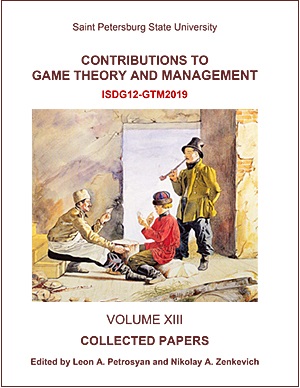Dynamic SPICE-Model of Resource Allocation in Marketing Networks
DOI:
https://doi.org/10.21638/11701/spbu31.2020.02Abstract
We consider a dynamic Stackelberg game theoretic model of the coordination of social and private interests (SPICE-model) of resource allocation in marketing networks. The dynamics of controlled system describes an interaction of the members of a target audience (basic agents) that leads to a change of their opinions (cost of buying the goods and services of firms competing on a market). An interaction of the firms (influence agents) is formalized as their differential game in strategic form. The payoff functional of each firm includes two terms: the summary opinion of the basic agents with consideration of their marketing costs (a common interest of all firms), and the income from investments in a private activity. The latter income is described by a linear function. The firms exert their influence not to all basic agents but only to the members of strong subgroups of the influence digraph (opinion leaders). The opinion leaders determine the stable final opinions of all members of the target audience. A coordinating principal determines the firms' marketing budgets and maximizes the summary opinion of the basic agents with consideration of the allocated resources. The Nash equilibrium in the game of influence agents and the Stackelberg equilibrium in a general hierarchical game of the principal with them are found. It is proved that the value of opinion of a basic agent is the same for all influence agents and the principal. It is also proved that the influence agents assign less resources for the marketing efforts than the principal would like.
Keywords:
differential Stackelberg games, marketing, opinion control on networks, resource allocation
Downloads
References
Downloads
Published
How to Cite
Issue
Section
License
Articles of "Contributions to Game Theory and Management" are open access distributed under the terms of the License Agreement with Saint Petersburg State University, which permits to the authors unrestricted distribution and self-archiving free of charge.




